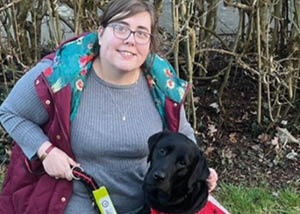
‘Light at the end of the tunnel”, was how Emily describes the moment she decided to approach Medical Detection Dogs. Suffering from PoTs and Mast Cell Activation syndrome, where external allergies and the body’s own immune system cause life threatening anaphylactic reactions, Emily was finding life increasingly difficult. The allergic reactions were so severe Emily was left struggling to breathe and had frequent and prolonged sessions in intensive care. She had been managing her life with medical help for around 8 years, but found the decline was so steep and rapid she no longer had any independence.
‘I was unable to be by myself’, says Emily, ‘I required 24 hour care. I had no warning of episodes and was not conscious enough to take my own emergency medication. I had to stop driving and give up work as a teacher. It felt like I was losing everything I’d worked hard for. The changes seemed to happen overnight and were taking over every aspect of my life’.
Emily, who lives in Northampton, had been told about the work of Medical Detection Dogs by a consultant several years before, but at that time did not feel she needed help. However, now, on seeing an Instagram post decided to find out if a Medical Alert Assistance dog could help her recover her independence. ‘It was the best thing I ever did’, she says. The idea that a dog could give me warning and alert me to an impending episode and hopefully prevent a more severe episode blew my mind’.
Emily admits to being sceptical at first, as although she had read amazing partnership stories and saw for herself the dogs in action at the MDD Centre, she did not want to be disappointed. ‘I had done every drug trial and tried pretty much everything to manage my condition and failed’. Happily her fears were unfounded.
Nieve, a now 3 year old black Labrador, was to change her life. ‘The first time she ever alerted I remember ringing my mum in (happy) tears to tell her that Nieve had detected an episode. I was so amazed by the alert I actually forgot to take my medication’, says Emily.
Nieve is trained to alert for Mast Cell Activation episodes. This means Emily has a 20 minute warning time of an episode, so she can get somewhere safe and call for help. ‘She is able to get my medication bag, water or my phone and will lay with me until I am safe to move. If I do lose consciousness she will lay her head on my lap until I come round, staring intently at me to let me know I’m safe. She always comes to hospital with me and is the best calming companion when things get tough and scary’.
At home Nieve also works hard to help Emily by retrieving things for her so that she doesn’t have to bend down which aggravates her PoTs. Emily explains that one of the hardest things about her condition is its’ invisibility. ‘I was always terrified of becoming unwell in public. People don’t understand how one moment you can be walking and talking and the next slurring your words and fainting to the floor. I would constantly worry about what other people would think. Would they think I was drunk or panic and call an ambulance when it wasn’t needed? I couldn’t explain what was happening.
‘The confidence Nieve has given me is immeasurable. I honestly can’t imagine my life without her now’, says Emily. ‘She has changed my life. She’s made me feel like “me” again. I no longer need 24/7 care and I’m able to go to places that I couldn’t before, as I always had to be within 12 minutes of a hospital. I’m no longer scared of losing consciousness in public and the constant fractures, cuts, bruises and other injuries from falling over are much less frequent’.
Looking forward to a belated honeymoon, much delayed by ill health, Emily is ready for the future. ‘Thanks to Nieve’s amazing nose and the team at MDD, I’m starting to think of places I’ve always wanted to visit that were never an option before. I’m able to start living again instead of just surviving and for that I’ll be forever grateful’.
